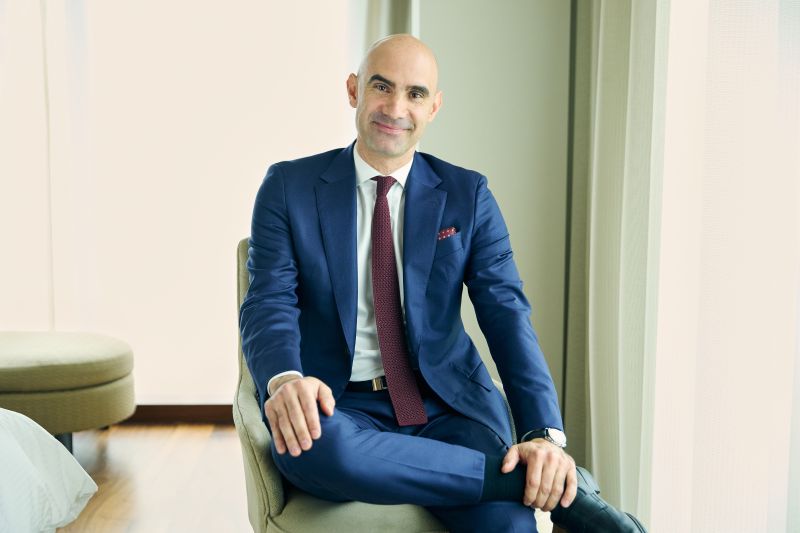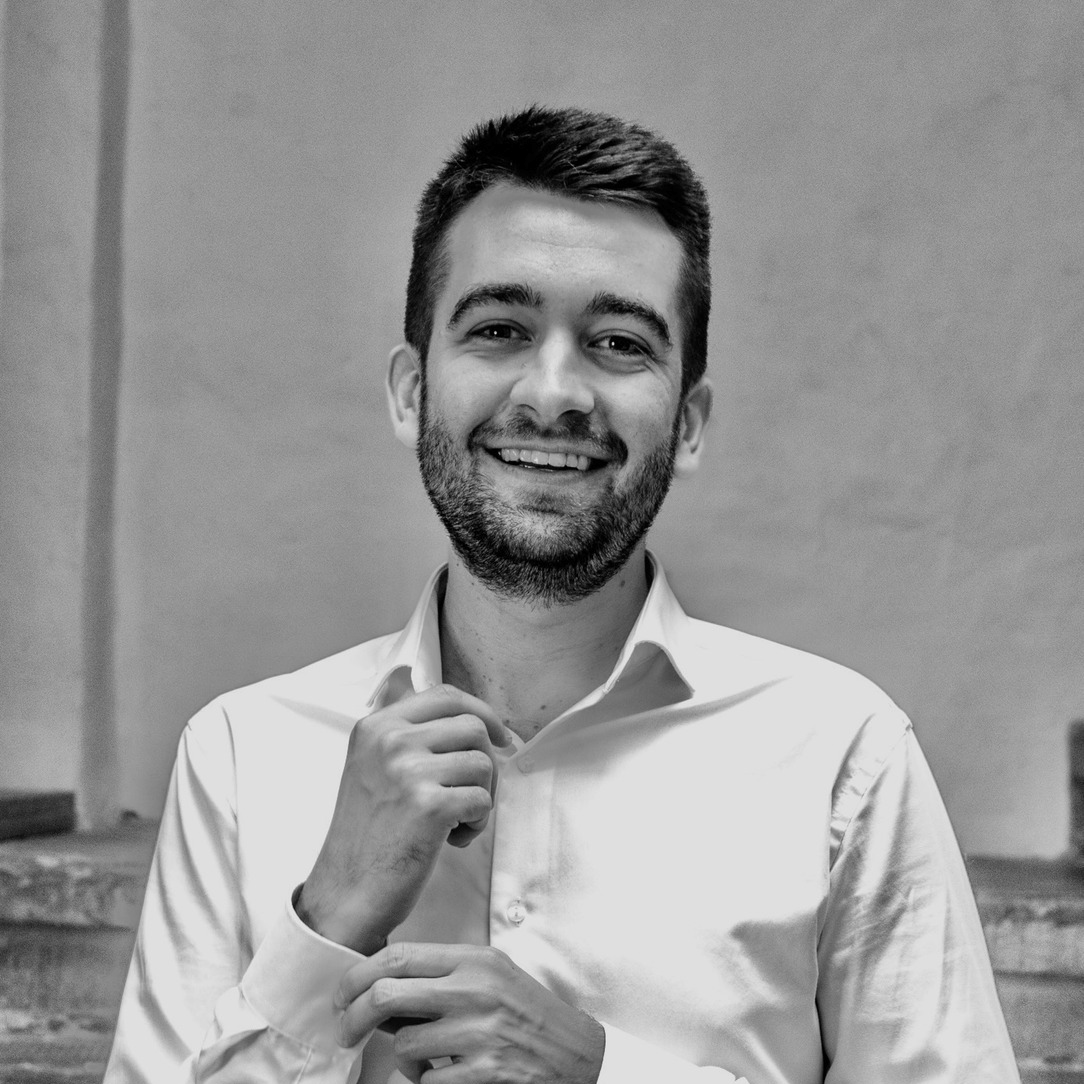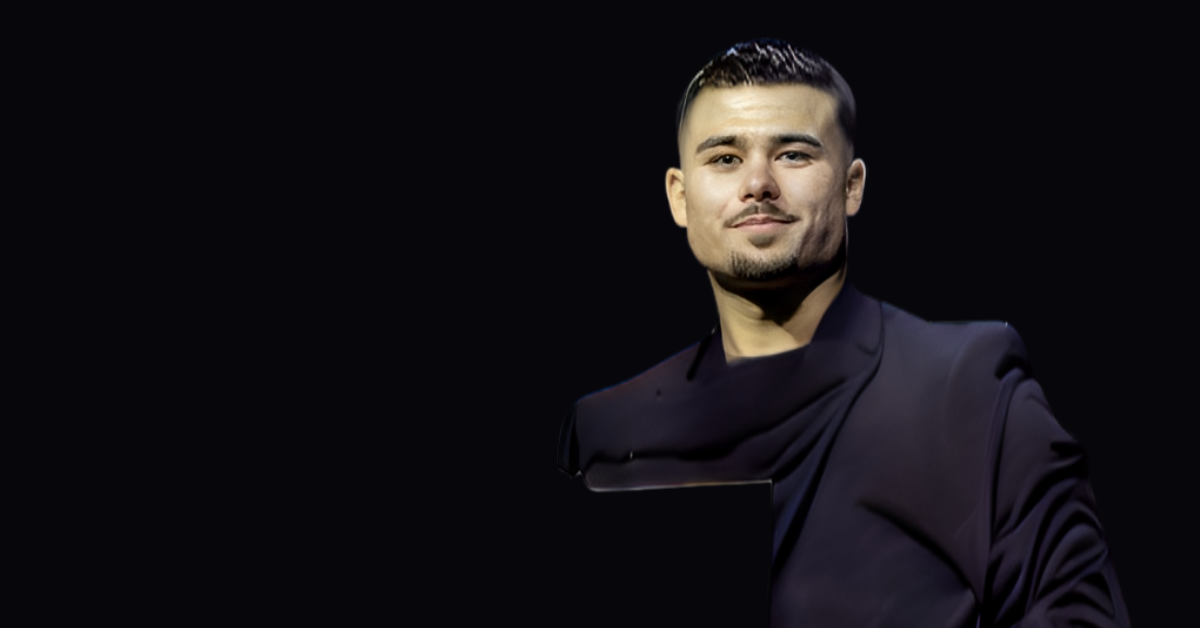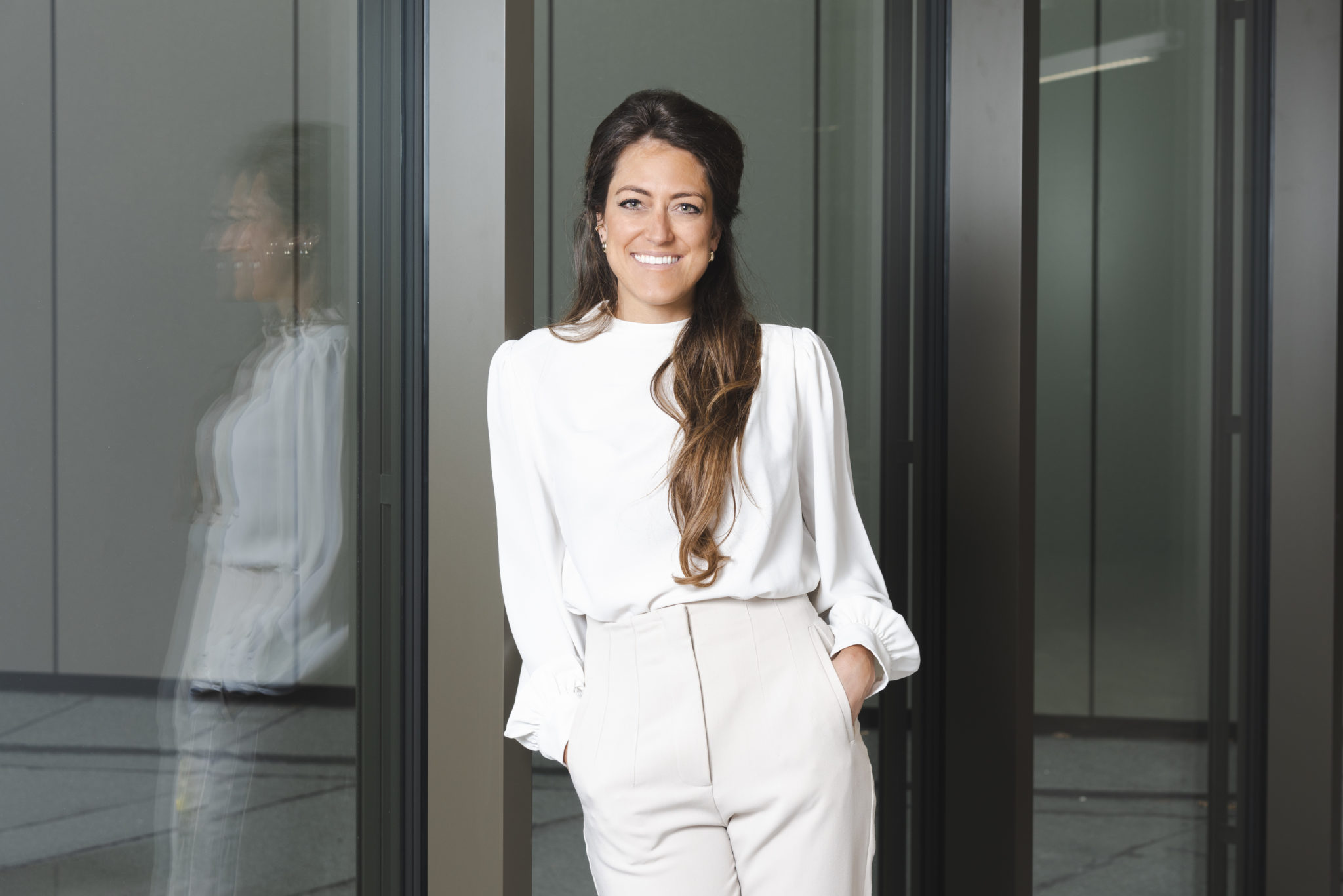Interview
Michel Wittwer
Throughout the corridors of the world’s greatest hotels, Michel Wittwer has left an indelible mark. From his beginnings at the École Hôtelière de Genève, he has risen through the ranks with exceptional determination and talent, to become one of the leading figures in the luxury hotel industry.
From Bishkek to Zurich, via Moscow, Paris, Nice and Vienna, Michel has adapted to a variety of cultures and challenges, while maintaining a clear vision: to offer unrivalled hospitality. In this interview, he opens the doors to his world, sharing anecdotes from his international career, his greatest challenges, and the philosophy that guides his management style.
“We welcome you and congratulate you on your recent appointment as General Manager of Park Hyatt Zurich. As an alumnus of the École Hôtelière de Genève, we thank you for sharing your thoughts with us, which are all the more inspiring for our community.”
Let's go back to your early days: what made you choose the École Hôtelière de Genève, and what dream did you have in mind when you first walked through the school's doors?
The hotel business is something that started very early for me. My uncle, Reto Wittwer, who was president and CEO of Kempinski, allowed me to travel and work in hotels during the summer vacations. This gave me a taste for the hotel business at a very young age.
I chose the École Hôtelière de Genève because it stays very close to what the hotel business represents through its internships, its exposure and the unique format of its program. When I joined the school, my dream was to continue traveling and discovering the world, which I have indeed been able to achieve.
If you had to describe your career path using just one word for each milestone, what would those words be and why?
- Moscow – discovery (new culture, new management style, new reference points).
- Paris – negotiation (working in a unionized environment, which completely changes the approach you need to take to developing projects and objectives for the hotel).
- Nice – seasonality (large volume of leisure customers, very different from the segments I’ve known until now).
- Vienna – a new brand (after Regency and Park, I’m discovering the Andaz brand in the “leisure lifestyle” segment, with some very interesting operational changes that are new to me).
- Zurich – home sweet home (back in Switzerland after 25 years abroad. Back with the Park Hyatt brand and very proud to take over the iconic Park Hyatt Zurich and launch with the teams the hotel renovation project with our new owners.
Career path
You've managed luxury hotels in very different cities. To what extent has your ability to adapt been put to the test? Is there a city that has particularly surprised you with its challenges or opportunities?
In every new country, it’s always important to take an interest in its history and culture. This helps you adapt your management style. You don’t manage a team in Russia in the same way as a team in France.
Moscow was a particularly interesting experience. Contrary to popular belief, I found the teams there very open and interested in the world. I really enjoyed working with them. It was a very nice surprise for me.
Incidentally, this experience in Russia also had a major personal impact on me. It was there that I met my wife, of Russian origin, with whom I have shared part of my life. We have a daughter with dual French-Russian nationality. This personal and family link with Russia keeps me connected to this country.
Career path
How have you managed to keep a global perspective while never losing sight of the importance of detail?
Your role as a leader is to stay the course and see objectives through to completion. My career in the hotel industry took me through the catering department, then operations manager and general manager. The modus operandi remains the same (team building, developing and coaching your team members and following through on projects…you’re always the person in charge of staying the course, like a captain on a boat.
One of the most important aspects of hotel management, in my opinion, is to truly live the hotel. It’s not enough to simply oversee operations from an office; you have to immerse yourself in the guest experience. That means sleeping in the rooms, eating in the restaurant, using the facilities as a guest would. In doing so, we discover essential details that may escape a quick pass or a standard check. For example, by spending a night in a room, you may notice aspects such as the comfort of the bed, the soundproofing, or the efficiency of the room service.
That’s why we make all new employees spend a night in the hotel. This gives them an intimate understanding of the customer experience, and really puts them in the shoes of those they will be serving on a daily basis. What’s more, it creates a sense of belonging and pride among employees, who see the hotel not only as their workplace, but also as a space where they can project themselves as customers.
“The success of a hotel is truly a reflection of the strength of its team.”
Could you talk about/describe an achievement that embodies your signature as a leader in the hotel industry?
My management style is based above all on building strong, cohesive teams. I firmly believe that the success of a hotel depends on the quality of the team that runs it. My role as a leader is to ensure that every member of the team is aligned with the hotel’s objectives and that we all share the same vision. If the team is united and shares the same values, then anything is possible.
Every department plays a crucial role in a hotel’s success. I’ve been lucky enough to be surrounded by extraordinary people throughout my career, who have not only supported me but also taught me a great deal. It’s essential to listen to your teams, take their advice, and move forward together towards a common goal. A hotel’s success is truly a reflection of the strength of its team.

How would you describe your management style?
-
Collaborative. Teams must take ownership of the hotel’s projects. To some degree, it must be their ideas that they defend and achieve.
I think this style helps develop the leadership skills of the future managers of my hotel.
What personal qualities and skills do you think it takes to be a leader?
Empathetic, listening to others and challenging the status quo… this encourages you to question yourself and what’s in place, and often leads you to bring about new changes or evolve existing processes.
Your career has evolved with loyalty to the Hyatt group, where you have held various positions in several establishments since 2003, culminating in your recent appointment as General Manager of Park Hyatt Zurich. What were the main reasons for this loyalty? What has Hyatt put in place to retain talent?
There are several key reasons for my loyalty to Hyatt. Right from the start of my career, Hyatt offered me unique opportunities, thanks to key people within the company who believed in me and gave me the chance to develop. I was able to progress rapidly, not on the basis of seniority, but thanks to my skills, commitment and willingness to learn. This recognition has enabled me to climb the ladder and be exposed to ever-greater challenges, while working in different countries and discovering new cultures.
Another fundamental aspect of my loyalty to Hyatt is their people-focused philosophy: “We care for people so they can be their best”. This focus on employee well-being is perfectly in line with my own values and management style. I’m convinced that when employees feel valued and supported, they give their best, which translates into better performance and quality service for customers.
Finally, the opportunity to learn continuously, to work on key projects and to gain invaluable international experience solidified my commitment to Hyatt. This combination of personal development, career opportunities and shared values is why I have remained loyal to Hyatt for 21 years.
What were the first initiatives you put in place when you arrived at the Park Hyatt Zurich?
It’s important to take the time when arriving in a new environment to understand and observe it before changing what’s in place. The hotel’s change of ownership brings with it a number of projects, including the creation of new high-end Suites, as well as the renovation and repositioning of the restaurant outlets and public areas.
Could you briefly describe a typical day as General Manager?
A typical day as a hotel General Manager (GM) always starts with a well-established plan, but rarely does the day go exactly to plan. In the hotel business, there are often unforeseen circumstances and last-minute adjustments to hotel operations. These can include guest situations, logistical problems, or specific requests that require immediate attention. The ability to adapt and manage these unforeseen events is therefore essential. One of the most important aspects of my role is balancing a number of responsibilities.
First of all, spending time with customers is crucial. Having a coffee with them, discussing their experience, and listening to their feedback is a priority. This not only helps to understand their needs and expectations, but also creates a personal bond that contributes to customer loyalty and continuous service improvement.
Secondly, it’s just as important to devote time to my teams. I make sure I’m out in the field, talking to employees, listening to them, and understanding their day-to-day challenges. Coaching and team development are essential to maintaining a high level of motivation and performance. My role is to ensure that every team member feels supported, valued and equipped to succeed in their role. As a leader, I see myself as a facilitator who helps employees reach their full potential.

Outlook and future
As leader of an iconic hotel like the Park Hyatt Zurich, how do you see the future of luxury in the hotel industry? What role do you think innovation will play in this evolution?
Luxury has a guaranteed future in our industry. Luxury codes are important to identify and maintain in every decision we make. Our customers’ profiles and expectations are changing. We’re going to integrate this important aspect into our project to renovate the restaurant areas and create new suites and rooms.
“Luxury is Personal” is the hallmark of our Park Hyatt hotels. This is exactly what our customers want. They want to experience something, and we create tailor-made experiences for our guests. Private visit to a watch factory, boat rental with picnic served on the lake, private visit to a chocolate factory, private yoga session on the hotel rooftop, and so on. Guests want to immerse themselves in local life and have access to what the locals have… the special place where no tourists go, the local restaurant where only locals go, etc.
We attach great importance to knowing our customers, their preferences and desires, so that we can be proactive rather than reactive. The luxury is to have services, objects and experiences offered to you without you having to ask for them, because we know you well enough to anticipate your desires. It takes a lot of time and work, but the return is so satisfying.
What are the main new trends you've identified in the hotel industry?
The profile of travelers has changed. Technological change has brought new professional functions (digital marketing, IT, consulting, etc.) that didn’t exist before, and they use and consume hotel products and services differently. The big office, the meeting room, etc. are no longer necessary, except in certain cases of course.
Work and leisure can be carried out in the same place. Gone are the days when work and leisure spaces were clearly separated. A leisure guest visiting a business hotel won’t feel like he belongs there, while a business guest staying at a property with a leisure atmosphere will feel perfectly at home. They’ll be able to work in an open-plan space, hold their meeting, then head for the bar, the restaurant pool, etc. Most hotels now seek to create a residential atmosphere in public spaces and rooms. The stereotype of the guest room, the lobby lounge, the breakfast restaurant no longer applies.
The way we travel and choose our destination has also changed. Social media has become an important part of how people choose their destination. Previously, the intern who took photos to post on social networks has been replaced by a marketing manager, a digital manager, etc. who spend a lot of time and energy understanding where to invest in advertising, on which social platform to post to reach the targeted customer, in addition to pushing for increased use of our own website as well as the number of customers enrolled in our World of Hyatt loyalty program.
Wellness and ecology have also become a major trend. Previously, people went on vacation to relax, drink, eat and forget about their diet. Most hotel chains now have hotels dedicated to these segments alone, such as Alila Hotels for Hyatt. Physical and mental health have become new segments for the hotel industry.
If you were to design the hotel of the future, what would be at the heart of your vision: technology, traditional hospitality, or something else?
I’ll change “traditional hospitality” to “personalized hospitality”.
The hotel of the future will have to meet increasingly specific and personalized expectations. Today’s guests are no longer just looking for a place to sleep; they want a unique, tailor-made experience. This implies a much more customer-centric approach to hospitality. In my opinion, personalization will be at the heart of this new era in hospitality. This could mean services tailored to guests’ preferences, personalized culinary offerings, or tailor-made local experiences.
In addition, well-being – both physical and mental – will become a central aspect. Customers are increasingly looking for experiences that allow them to recharge their batteries, take care of themselves, and find a balance between body and mind. This could include holistic wellness programs, integrating nutrition, sport, relaxation and even more subtle elements such as fragrance or soundscape.
At the same time, technology will continue to play a crucial role, but it must be integrated seamlessly and intuitively, without overriding the human experience. The hotel of the future will not just be a place to stay; it will become a space where every aspect of the customer experience is carefully designed to offer maximum comfort, personalization and well-being.
“Thinking back to my early days, I would tell myself not to blindly follow traditional models.”
If you could go back to the beginning of your career, what advice would you give yourself?
“Process challenge.
If I could go back to the beginning of my career, the advice I would give myself would be not to be afraid to challenge established processes and dare to question traditional practices.
Thinking back to my early days, I would tell myself not to blindly follow traditional models. It’s essential to innovate and challenge yourself regularly. For example, instead of simply applying the methods we’ve learned, it’s invaluable to look at what’s being done in a market or in other luxury sectors. We can draw inspiration from their flexibility, their ability to adapt quickly to trends and to offer innovative services. One of the lessons I’ve learned in my career is the importance of agility and the ability to constantly rethink processes.
Sometimes, minor changes in the way operations are managed can have a significant impact on customer satisfaction and team efficiency. It’s also crucial to encourage this culture of questioning among teams, by creating an environment where everyone feels comfortable proposing new ideas and suggesting improvements. The hotel industry has been faced with major transformations, such as the rise of online booking platforms, the rise of new hotel management technologies, and unprecedented challenges like the COVID-19 pandemic. These events have shown that rigid practices are no longer enough, and that it is essential to be ready to adapt processes to remain relevant and competitive.
In short, if I could advise the young Michel Wittwer at the start of his career, I’d tell him to be curious, open to change, and never afraid to rethink the way things are done. It’s by challenging established processes that we can truly innovate, improve the customer experience and create lasting added value for the hotel and its teams.”





